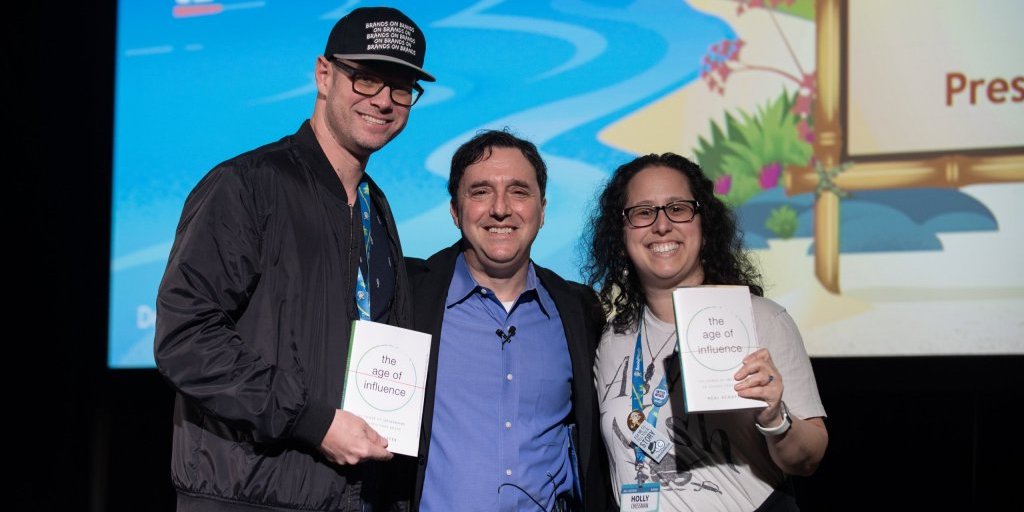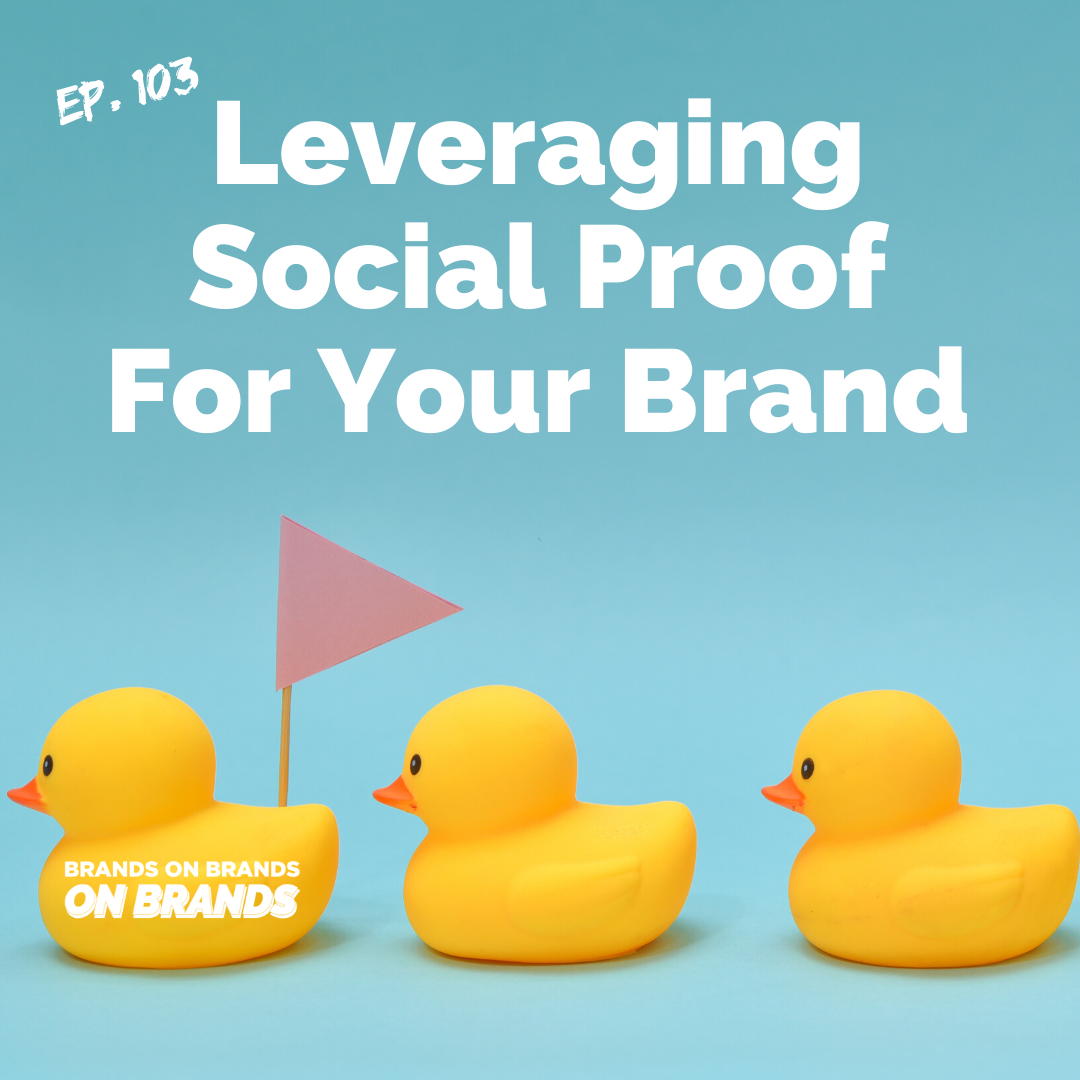Today, we’re going to break down the idea of social proof and how to apply it to your business and, more importantly, your brand.
Now remember, developing your personal brand framework is about developing your message, your community and your impact. As you are the the “developing your message” stage of the framework, one critical step is to create social proof.
[iframe style=”border:none” src=”//html5-player.libsyn.com/embed/episode/id/12946658/height/90/width//thumbnail/yes/render-playlist/no/theme/custom/tdest_id/1265045/custom-color/2ddae4″ height=”90″ width=”100%” scrolling=”no” allowfullscreen webkitallowfullscreen mozallowfullscreen oallowfullscreen msallowfullscreen]
What is Social Proof?
Social proof as a concept has been around for a long time, so you might be familiar with it. I had seen the idea everywhere, but the actual concept of it really solidified for me when I read the book “The 4-Hour Workweek” by Tim Ferriss.
He talks a lot about how to very quickly become an authority in your market. There are more traditional ways, like writing a book, becoming a public speaker, and building yourself as the authority in a certain market.
That all makes sense, but Tim was looking for a quicker way to do that. I don’t remember his full exhaustive list, but a lot of those hacks were instant credibility things such as:
- I wrote an article that has been featured in Forbes.
- I’ve been interviewed on CNN.
- I met Oprah.

What Tim was tapping into was that if you can get some kind of certification or credential or testimonial from people, you stand out. These are triggers to people that say, “This person knows what they’re talking about.”
If you are out there building a business based on your personality, or more importantly your reputation, social proof is extremely important.
Today we’re gonna talk about three ways to earn social proof.
- Demonstrating your expertise
- Creating association
- Being featured on other platforms
Demonstrating Expertise as Social Proof
If you want someone to believe you are the authority in your subject, the first thing you need to do is demonstrate expertise in your messaging. You need to show people you know what you are talking about.
You need to find a way to quickly provide the depth of knowledge that shows you have been doing this for a while, or you need to give them a quick win: a solution, resource or tool that shows them you are the real deal.
Demonstrating expertise can happen a lot of ways. For some, it is just completing a task repetitively over time. Their history of the task shows expertise. They can catalog and store all of this on a blog or website, and they can then tap into the fact they have a long history of completing the task as proof of their expertise.

Another way people demonstrate expertise is to go really deep, really quickly on one very specific topic. They give you the research you would not have done the work to do yourself, things like:
- Statistics
- Trends
- Useful resources and links
If they can really hone in on a niche topic in their area of expertise, then it shows you they know more than you do, and you can learn from them.
Find a way that works for you by fitting your personality and style.
THE FLASH ROLE
Someone in sales once taught me the idea of a flash role. His sales meetings would be very limited on time, so the group came up with this idea of a flash role where at the right prompt at the right period of time, they would go into something very technical very quickly that demonstrated their authority in the topic.
By using language the experts in the field understand, they demonstrated a very deep level of understanding of a particular area of expertise, and they did it very quickly.
You demonstrate expertise when you can rattle off the most important features or the vital facts or figures very quickly and in a concise, well thought out format.
Now, this is not something you just do automatically. It is something that has to be practiced. It potentially has to be scripted and learned. So write it down and rehearse it. Before long, it will be easy to recall and bring up over and over again.
Creating Association as Social Proof
A lot of businesses, especially service providers like consultants, need some kind of tip-off to alert people that they are worth listening to.
When you’re new, you probably have to get that tip-off from someone else. This may be another respected person in your field that says, “This guy is legit. He’s great. I love him.” It could also be a business that ranks you as an authority.
You could also get it by interviewing experts and thought leaders. If the person you are interviewing has already been designated as an authority in your area, the proximity of the interview creates an association that says you must be close to the same level of respected authority.

People will assume that if you have a longer conversation with this person, it shows you must talk with this type of person all the time. Social proof is basically you taking that reputation and attaching yourself to it.
This creates an association, and building these relationships is super important.
So, how do you get out there and network? Go to the places where the authorities are, and put yourself in an environment to meet them.
You may not meet all the ones you want immediately, but you can make a dream 100 list of the people that are really respected in your industry and make it a goal to go where they are.
You’re eventually going to run into them in some way, shape, or form, and you can prep for it by starting to interact with them on social media. The internet makes it really easy for pretty much anyone to gain access.
START WHERE YOU ARE
Now, there are going to be people who are harder to get to than others. You might never reach them, so you’ve got to have some people in the middle that are attainable. If you put yourself into the right situations you can achieve this. Where can you start?
- Pay for an event they are hosting.
- Go to a conference they are speaking at.
- Go into their online channels and establish yourself.
- Interact with their live feeds.
- Interact in their courses.
Through this, you can reach out to them and say “Hey, I’d love to meet you and shake your hand.” These steps can start a relationship. It started so many for me.

Just by physically being in enough places consistently, you’re going to start to run into and meet people. You’re going to meet people that can introduce you to the other people you’re trying to meet. That is a way to get in the right room by meeting people that are going to give you the association you need.
If you are better at doing this digitally, you can. However, I would say you need to reinforce these relationships with in-person contact.
Either way, you cannot do this alone.
DEVELOPING NEW FRIENDSHIPS
I read recently that if you want to have a relationship that has weight and builds into a deeper relationship, it takes more than just one or two interactions.
To build a casual friendship with someone, it takes about 50 hours of contact. A close friendship? About 200 hours.
What that means is you’ve got to be putting yourself into rooms with people over and over again and following up and having conversations.
So how do you get to know these industry figures?

Find new ways to go from an acquaintance to a friend. You can associate quicker by doing things like interviews. If you actually want a relationship where they point back to you, you’ve got to use these in interactions as ways to start that trend. This shows this is a long-term game.
Go out and start making those contacts. Develop relationships over time. Ask yourself, “What does it take to actually get to know this person?”
For starters, identify half the people on your dream list who seem most open to continuing a relationship with you. Those are the ones you’ve got to spend extra time with. Get onto more calls, or go to their media channels. If they have platforms, get on those or develop your own interaction.
In the first six months, you may just be associated as showing up in their community, but over time they’ll start to think, “Gosh, this person really shows up consistently.”
That’s how you develop a relationship and an association. And that’s a huge piece of social proof: creating association with people in your industry that are already where you want to be.
Getting Featured on Other Platforms Creates Social Proof
It takes time to form a close relationship. However, you don’t need to have these deep relationships with people to suddenly be featured on their platforms. Sometimes you just need to have the right message at the right time.
People are featured on podcasts all the time. They are going and guesting on other people’s shows because they figured out a message they can deliver. They’ve honed their story and they found the right words to say to get a yes on these interviews.

It can be a podcast. It can be a blog that you’ve written an article for that was intriguing that someone wanted to post.
You can simply go join a Facebook group that has a bunch of people in your industry and be helpful in that group. Find ways to post, reply and interact in those groups. If you message the people that run those groups, they may consider letting you post something a little bit more interesting or doing a collaboration.
START COLLABORATING
Some groups are actually built for collaboration. Try finding a way for you to work with someone else and cross-promote and share content. It is a great way to develop a relationship where you are sharing an audience with each other.
This is why I love doing a podcast. Not only is guesting great, but also hosting your own podcast. People come on your show, and they share that interview with their audience. If it is something unique, they are going to be even more motivated to share because they want their audience to hear this perspective they have created.
It takes a little bit of work and time to figure out what you’re going to say in these situations. It all goes back to developing your message to the point that you have practiced and can deliver it with authority.
Where can you deliver it? It could be small groups. It might be five to ten people at first. One-on-one is a possibility, too. You will get on calls with people and get to know them while delivering your message. Do it enough times, and you’re going to start to see that people want to hear your message.
Getting Outside Approval Creates Social Proof
The social proof, the thing that says you are the expert, is the go-ahead from other people in your industry. If you’ve got their approval, or they want you on their show or want to share your message, that’s social proof.

They are gatekeepers. They’ve developed shows, so they get to say yes or no to sharing your message.
Now, you have to have some kind of compelling reason that they want to bring you on their show.
So again, it starts by demonstrating your expertise by getting featured, writing articles, creating content, and doing the work behind the thing you want to talk about.
Then create associations and build relationships so you’re in a good place to put in your ask: “Hey, I’d love to be featured on your show. My big message right now is this. Is that something your users would find value in?”
A few people might say yes, and a few might say no, but you don’t have to get them all. They will start to add up.
BORROWING AN AUDIENCE
At this point, you can start referencing these interviews, and people can go back and listen. They might decide they’d love to bring you onto their show. People are always looking for experts in their space to curate and show up at their events and you can do little workshops with them or on your own.
Getting featured on other platforms is a faster way to build an audience than trying to build it on your own. I think everyone should build their own platform, but getting somewhere more quickly is going to specifically rely on you going to places that have already built an audience.
You will build your audience over time, but you need to borrow an audience as quickly as possible in the short term. It helps your credibility, and it helps develop association with leaders in your industry, whether on your own platform or theirs.
Start Developing Social Proof Today
Demonstrate your expertise, create association with successful people in your field, and get featured on other platforms, and you have developed social proof.
It might not be to the level of “He wrote for Forbes magazine,” or “She has been on CNN,” but each bullet on your list is a cue to let people know you are legit. It’s validated, and you aren’t just someone else off the street.
A lot of people in your field have social proof, but you are now separated from the rest who haven’t gotten there yet.
How you share that information is up to you.
MORE ADVICE AND INTERVIEWS
If you’d like my full plan for how to build your content marketing strategy, check out my free Content Marketing Starter Guide.
And here are some more of my most popular thought leader interviews!
- What Business to Start with John Lee Dumas
- Personal Branding Masterclass with Chris Ducker
- Built to Serve with Evan Carmichael
